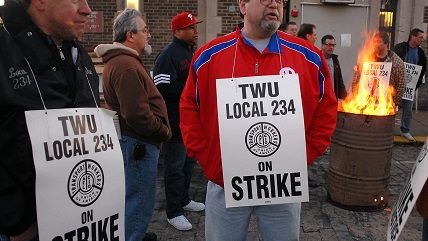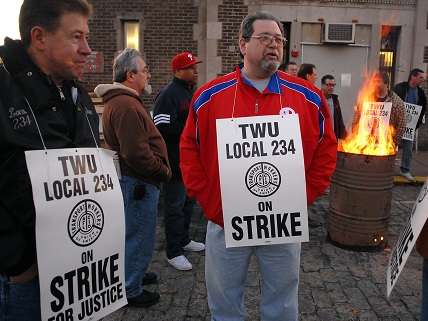Hillary Clinton Campaign Concerned About Philly Transit Strike Affecting Election
Contract expired yesterday, union voted weeks ago to authorize strike.


Members of the Transit Workers Union in Philadelphia (Local 234) walked off the job starting at 12:01am this morning, after union and transit authority negotiators failed to reach a deal on a new contract. Workers voted to authorize the possibility of a strike two weeks ago.
Democratic Rep. Bob Brady, who calls President Obama "boss," visited the Sheraton Hotel where negotiations were being held, to encourage a deal, Philly.com reports. He told negotiators there that Hillary Clinton's Pennsylvania director had "a little concern" about a strike lasting through Election Day, saying it was "gonna hurt."
Among the most salient sticking points in the negotiations, the Southeast Pennsylvania Transit Authority (SEPTA) wants workers to contribute up to $6,000 a year into their healthcare plans. Workers currently enjoy "Cadillac" plans for which they pay $552 a year. Healthcare plans for individuals making $52,000 a year (the average annual salary for the transit workers, according to NBC Philadelphia) run between $300 and $700 a month on the Obamacare exchange for the Philadelphia area. As Avik Roy noted at Forbes in 2014, the last time SEPTA workers went on strike in part because of healthcare contributions, union support was a major factor in getting the Affordable Care Act passed. Perhaps rather than asking Philadelphia residents and area commuters to pay for their healthcare plans, the union workers should turn to the mechanisms their unions and the politicians their unions endorse have set up. The Transit Workers Union endorsed Barack Obama and Hillary Clinton.
TWU workers also complain about a pension cap of $50,000 that did not apply to managers, Philly.com reports. Such a cap certainly seems like it would be even more effective at controlling costs if it extended to all types of employees. SEPTA say its $1.2 billion pension liability is only 62 percent funded (so it could be even worse). Union officials also say that they are negotiating for longer breaks and to raise the minimum amount of mandatory time off between shifts, now at nine hours. SEPTA says it is already adjusting schedules.
The transit authority promises to seek an injunction forcing workers to return to the job if the strike conflicts with Election Day. The local elections commission says a 2009 strike did not depress voter turnout. Philadelphia is a heavily Democratic city, with Mitt Romney failing to win a single vote in 59 wards in 2012. Suburban SEPTA service remains operational, as those workers are represented by a different union, although reports on Twitter suggest TWU workers are blocking some of those services. SEPTA workers are organized under 17 different unions, of which TWU Local 234 is the largest.


Show Comments (103)